Understanding Psychiatric Consultations in Nursing Facilities
Psychiatric consultations in nursing facilities are vital for addressing the high prevalence of mental health issues among elderly residents. With conditions like dementia, depression, and behavioral disturbances common in these settings, specialized assessments help tailor treatment plans that improve quality of life. This article explores what residents and their families can expect during these evaluations, the roles of healthcare professionals involved, and the scope of services provided to foster better mental health outcomes.
Roles of Healthcare Professionals During Psychiatric Evaluations
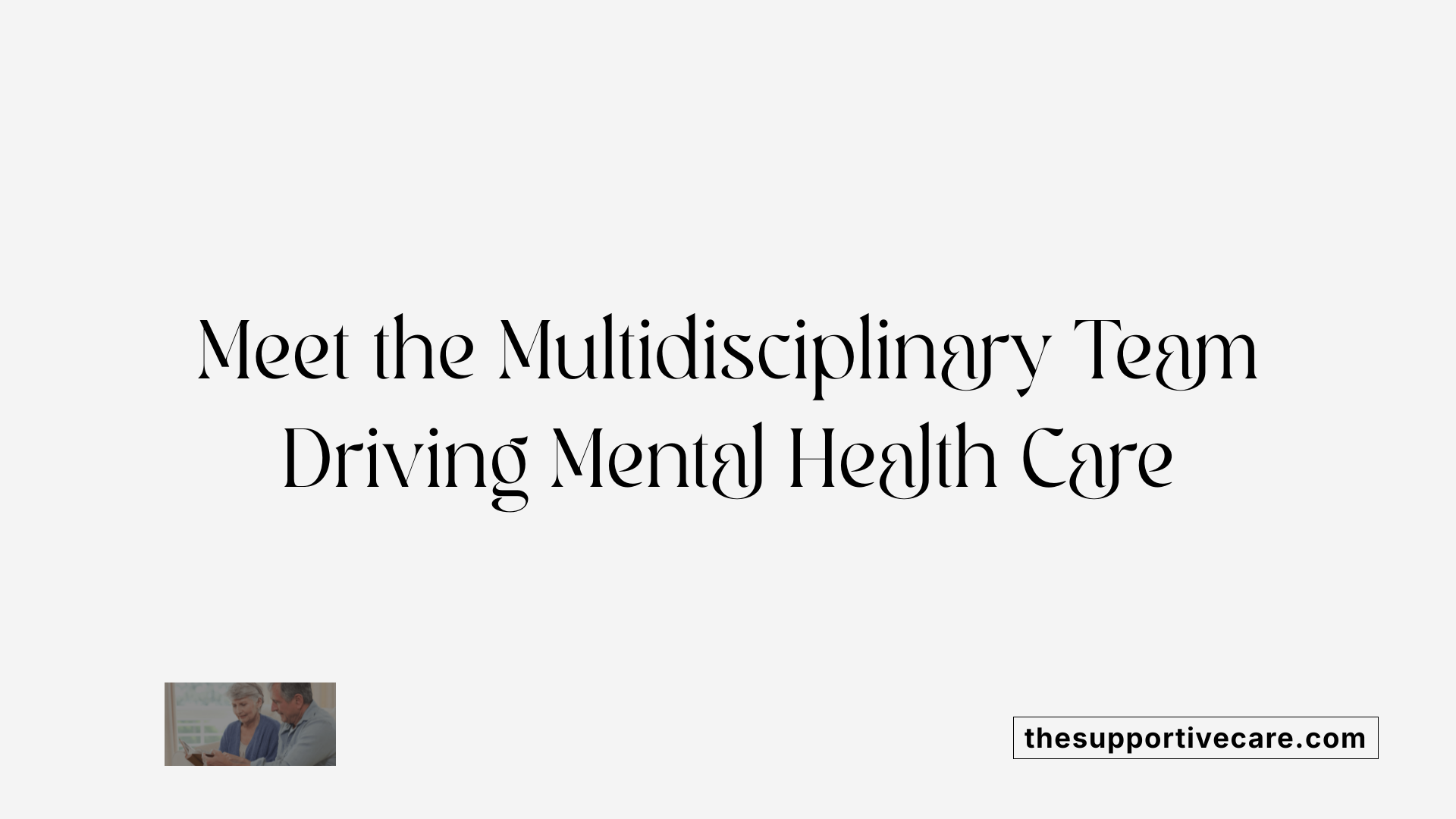 In nursing facilities, psychiatric evaluations involve a collaborative effort among various healthcare professionals to accurately assess a resident’s mental health. Psychiatrists, who are medical doctors specializing in mental health, play a central role in conducting in-depth assessments. They utilize clinical interviews, psychological testing, and reviews of the patient’s medical history to diagnose conditions such as dementia, depression, or psychosis.
In nursing facilities, psychiatric evaluations involve a collaborative effort among various healthcare professionals to accurately assess a resident’s mental health. Psychiatrists, who are medical doctors specializing in mental health, play a central role in conducting in-depth assessments. They utilize clinical interviews, psychological testing, and reviews of the patient’s medical history to diagnose conditions such as dementia, depression, or psychosis.
Support staff, including nurse practitioners and nurses, also contribute crucial observations. They monitor ongoing symptoms, observe behavioral changes, and help administer medications prescribed by psychiatrists. This continuous care supports the physician’s assessment and helps ensure treatment plans are properly followed.
A multidisciplinary team approach is essential for comprehensive evaluation. This team may include psychologists, social workers, and counselors, all working together to develop personalized care strategies.
Monitoring physical health and medication effects forms part of their responsibilities, allowing for timely adjustments to treatment and improving overall mental health management. This integrated method ensures residents receive appropriate, effective, and coordinated care tailored to their needs.
How Residents and Families Can Prepare for a Psychiatric Consultation
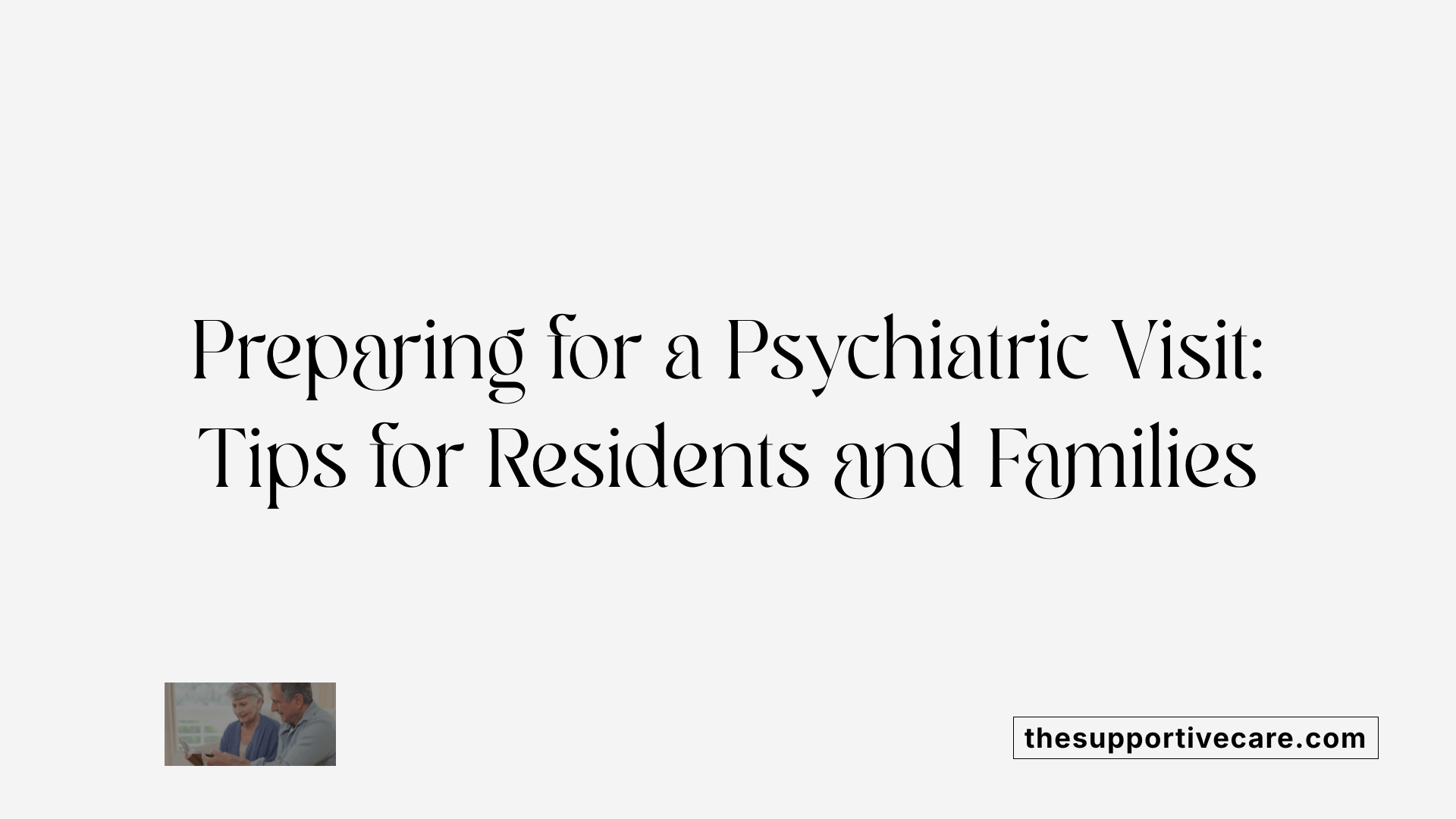
How can residents and families prepare for a psychiatric consultation?
Preparing for a psychiatric consultation is crucial to ensure that healthcare providers have all the necessary information to diagnose and develop an appropriate treatment plan. Families and residents should start by gathering a complete medical and psychiatric history. This includes documenting any past mental health issues, previous treatments, medications taken, and relevant family mental health history.
Creating a list of current symptoms, concerns, and questions in advance can make the appointment more productive. Tracking symptoms over time—such as noting their frequency, duration, and how they affect daily life—is particularly helpful. This way, the mental health professional can better understand the resident’s condition.
Being honest and open during the consultation is essential. Sharing feelings, social circumstances, and concerns honestly helps the clinician make precise assessments. It is also helpful to review the appointment details carefully: understand the process, any costs involved, and consider potential barriers to treatment, such as transportation or language barriers.
Families should encourage their loved ones to participate actively, and both should feel comfortable discussing sensitive topics. Bringing relevant documents, like lists of current medications and previous treatment records, can facilitate a smoother process.
Overall, thorough preparation fosters effective communication, enabling the healthcare team to develop a personalized and comprehensive care plan tailored to the resident’s needs.
Considerations Residents Should Keep in Mind When Preparing for a Psychiatric Evaluation
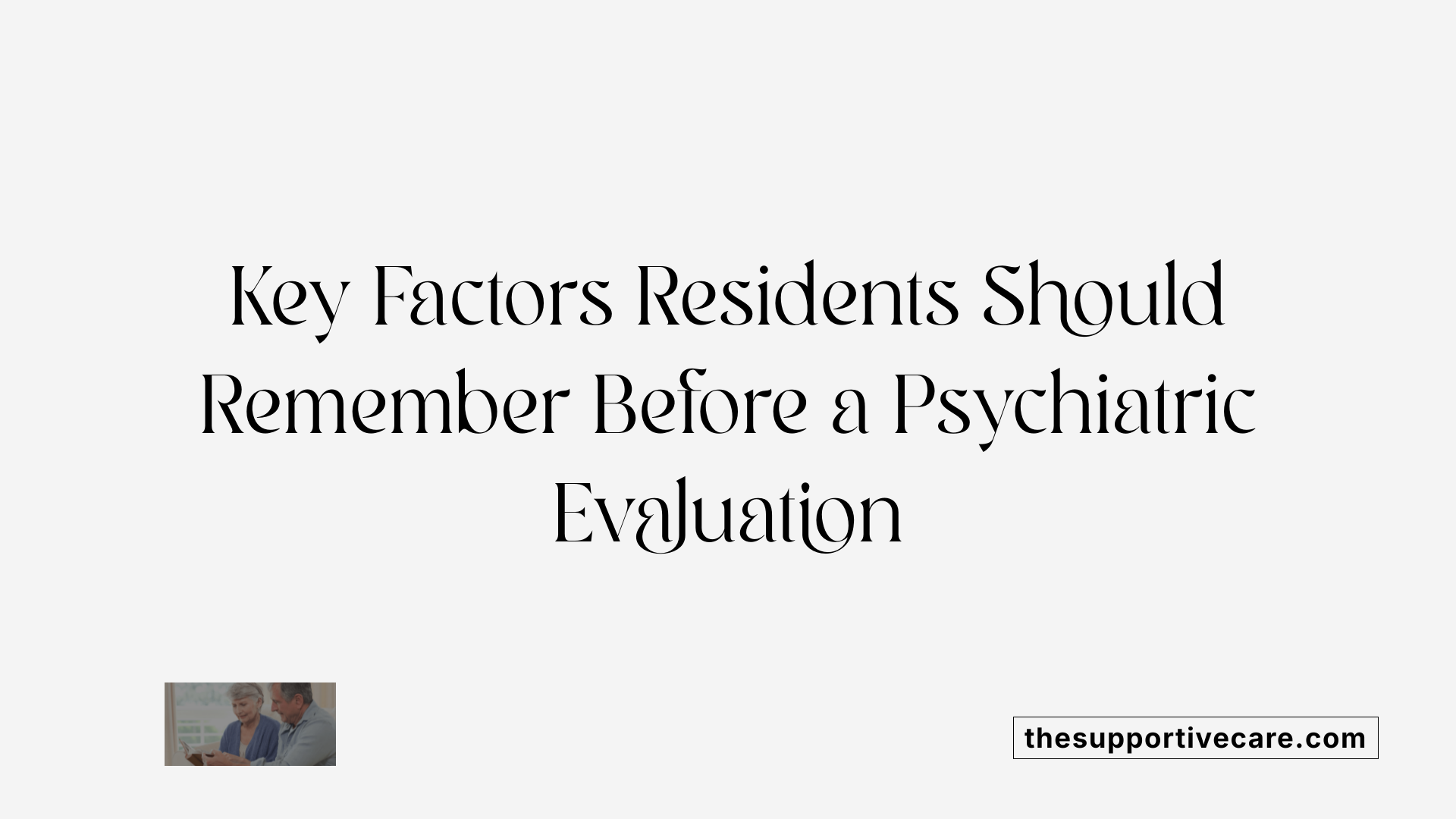
What considerations should residents keep in mind when preparing for a psychiatric evaluation?
Residents preparing for a psychiatric evaluation in a nursing or long-term care setting should first gather thorough information about their mental health history. This includes noting current and past symptoms, previous treatments, medications, and any hospitalizations related to mental health. Keeping a symptom diary can be helpful in providing detailed insights during the assessment.
Understanding confidentiality and legal aspects is also vital. Residents should clarify whether the evaluation is voluntary or mandatory, and be aware of their rights regarding privacy. Knowing the legal implications can help residents feel more comfortable and informed about the process.
Verifying the credentials of the mental health professionals involved is another important step. It ensures that the assessment is conducted by qualified individuals with appropriate expertise, such as licensed psychiatrists or psychologists. Checking whether the professionals are authorized within the facility or covered by insurance can help avoid delays or additional costs.
Residents are encouraged to be honest and open during the evaluation to allow for an accurate diagnosis and effective care plan. Active participation, including asking questions about treatment options, potential involvement in decision-making, and available resources, can improve outcomes.
Building rapport with the psychiatrist, feeling comfortable with the provider, and sharing relevant personal information help facilitate a productive assessment. Keeping notes or records of one's mental health experiences can also support the clinician in developing a tailored treatment plan.
In summary, thorough preparation, understanding legal considerations, verifying professional credentials, and engaging actively in the process can significantly enhance the effectiveness of a psychiatric evaluation, leading to better mental health support for residents.
Typical Procedures and Assessments During a Psychiatric Evaluation
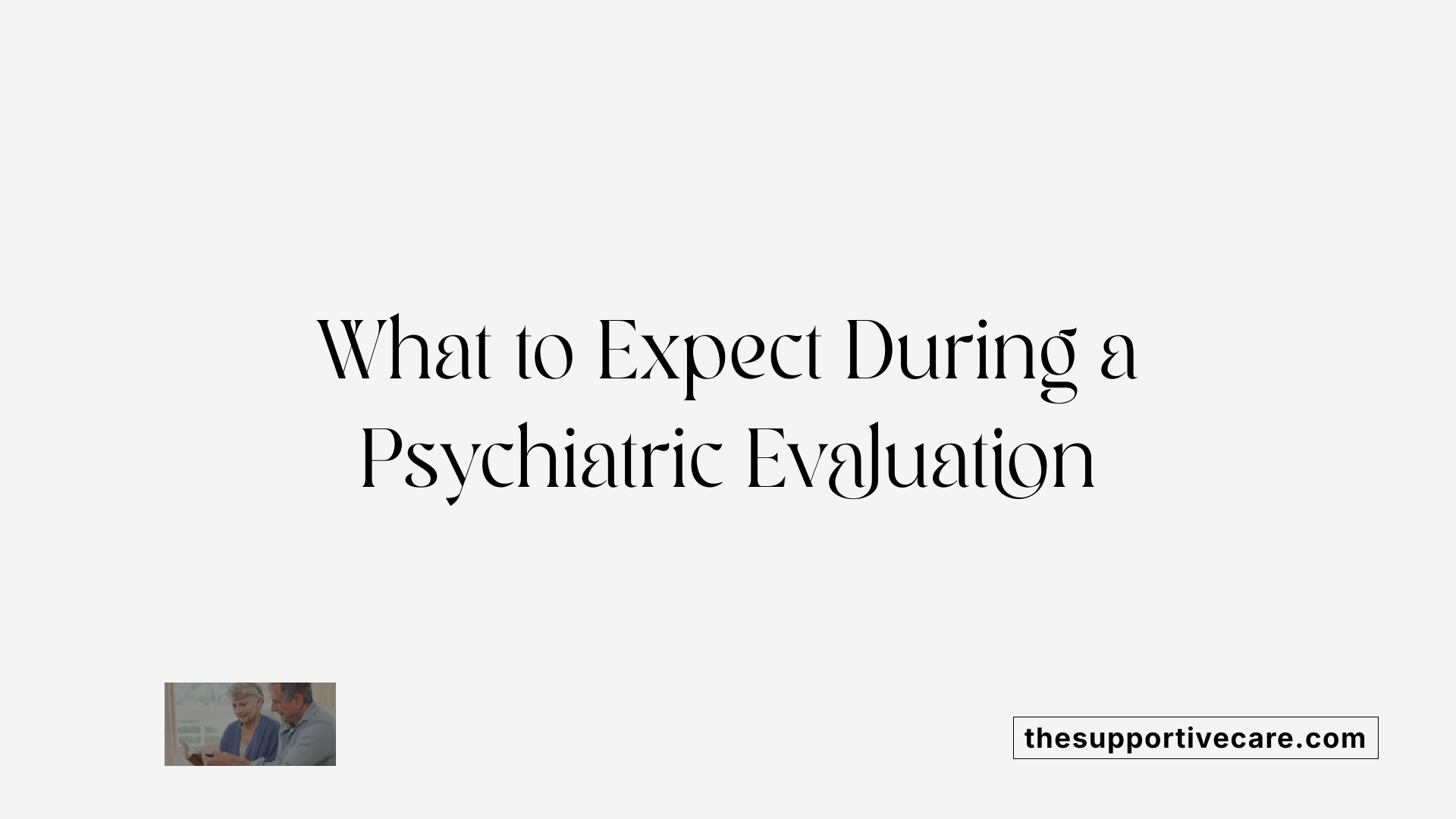
What are the typical procedures and assessments involved during a psychiatric evaluation in a nursing setting?
A psychiatric evaluation in a nursing setting encompasses several systematic steps designed to obtain a detailed understanding of the resident’s mental health. The process begins with a comprehensive collection of medical and psychiatric history, which includes current symptoms, previous mental health issues, family history, and medication use. This helps clinicians understand the background and possible contributing factors to the resident’s condition.
Next, the mental status examination (MSE) is conducted. This structured assessment evaluates various cognitive and emotional functions such as appearance, behavior, mood, thought processes, perception, cognition, and insight. The MSE provides real-time insights into the resident’s current mental state.
Standardized assessment tools may also be employed during the evaluation. These tools include scales and questionnaires that assist in diagnosing specific conditions like depression, anxiety, or dementia. They contribute to a more objective measurement of symptom severity and functional impairment.
Depending on the initial findings, additional assessments might be necessary. This can involve psychological testing, behavioral observations, or formulation of individualized treatment plans. For residents with complex needs, assessments may extend to safety evaluations and risk assessments to determine the appropriate level of care and intervention.
Overall, this thorough evaluation process aims to develop a personalized understanding of the resident’s mental health profile, guiding clinicians in making informed treatment and management decisions tailored to each individual’s needs.
Scope of Mental Health Services During Psychiatric Assessments
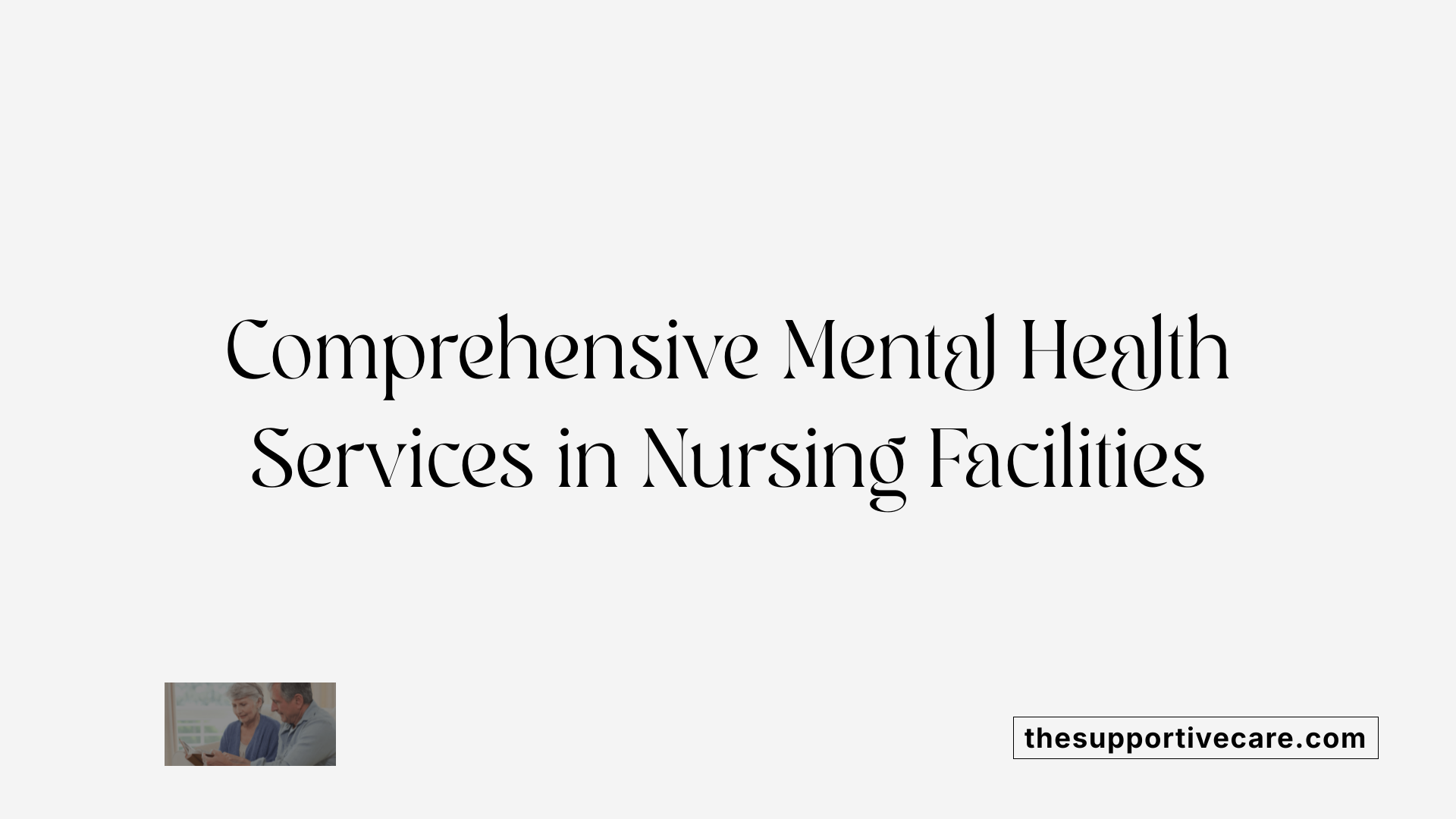
What is the scope of mental health services provided during psychiatric assessments in nursing facilities?
Psychiatric assessments in nursing homes are comprehensive processes designed to evaluate and address residents’ mental health needs thoroughly. During these evaluations, mental health professionals use standardized tools such as the Minimum Data Set (MDS) to assess cognitive and emotional status, behavioral issues, and psychiatric symptoms.
The assessment process focuses on creating personalized treatment plans that incorporate various services. These may include medication management to optimize efficacy and reduce inappropriate use, psychotherapy to help residents cope with issues like depression and anxiety, and behavioral interventions aimed at reducing agitation and disruptive behaviors.
Non-pharmacological therapies, such as reminiscence therapy and other evidence-based approaches, are often tailored to individual needs, aiming to improve quality of life and mental well-being. Regular monitoring of medication effects and safety is a crucial component, ensuring that treatments are effective and side effects are minimized.
These services are delivered through multidisciplinary teams that include psychiatrists, psychologists, social workers, and nursing staff. Their collaborative effort helps develop recovery-oriented, person-centered care plans that uphold dignity and respect for each resident.
In some cases, when psychiatric conditions are severe or unmanageable within the facility, services extend to psychiatric hospitalization or specialized interventions, with ongoing assessment to refine care plans.
Overall, the goal of these assessments and subsequent services is to foster mental health stability, promote autonomy, and enhance overall well-being, aligning treatment approaches with ethical standards and residents’ preferences.
Issues Addressed During Psychiatric Consultations for Elderly Residents
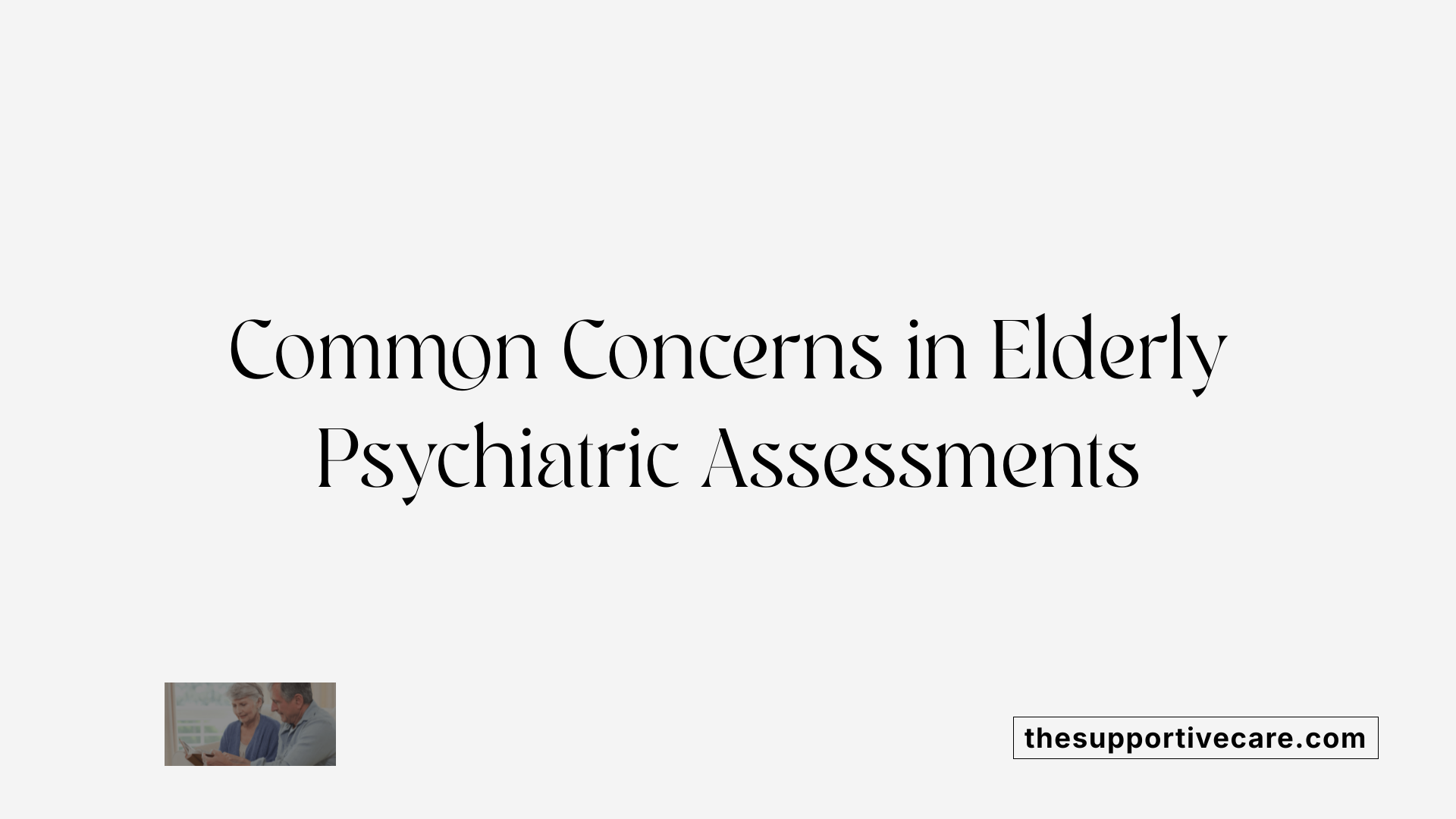
What issues are typically addressed during psychiatric consultations for elderly residents?
Psychiatric consultations for elderly residents in nursing homes are comprehensive assessments that aim to identify and manage a variety of mental health concerns common in this population. The primary issues include neurocognitive disorders such as dementia, Alzheimer’s disease, and other forms of cognitive decline, often accompanied by behavioral disturbances like agitation and disorientation.
Mood and anxiety disorders are also prominent, with depression and anxiety being highly prevalent yet frequently underdiagnosed. Symptoms such as persistent sadness, fatigue, decreased interest, avoidance, muscle tension, and sleep problems are central to these evaluations.
Psychosis and agitation constitute another significant focus area. Some residents may experience hallucinations, delusions, or aggressive behaviors, which require careful diagnosis and tailored interventions. Managing psychotic symptoms often involves medication adjustments along with behavioral strategies.
Medication management forms a critical component of psychiatric consultations. The goal is to optimize pharmacotherapy, avoid polypharmacy, and reduce side effects, especially considering the altered pharmacokinetics in elderly patients. Additionally, social challenges—such as social isolation, caregiver stress, and stigmatization—are evaluated and addressed.
Consultations also encompass assessing residents’ cognitive and functional abilities to determine their levels of independence and safety. Developing personalized care plans often involves a multidisciplinary approach that combines psychotherapy, behavioral interventions, and appropriate medication.
In sum, these assessments seek not only to treat existing conditions but also to improve overall quality of life, support family involvement, and facilitate safe, tailored, and holistic treatment strategies.
| Issue Category | Common Symptoms | Interventions & Goals | Biological, Psychological & Social Focus |
|---|---|---|---|
| Neurocognitive disorders | Memory loss, disorientation, impaired judgment | Cognitive support, behavioral management | Evaluate brain health, address social circumstances |
| Mood and anxiety disorders | Sadness, hopelessness, restlessness, sleep issues | Therapy, medications, lifestyle changes | Emotional well-being, social support, stigma reduction |
| Psychosis and agitation | Hallucinations, aggression, disorganized thinking | Medication, behavioral therapy | Manage symptoms, maintain safety |
| Social challenges | Loneliness, caregiver stress | Community involvement, family education | Reduce social isolation, improve relationships |
How Psychiatric Evaluations Aid in Diagnosis and Treatment Planning
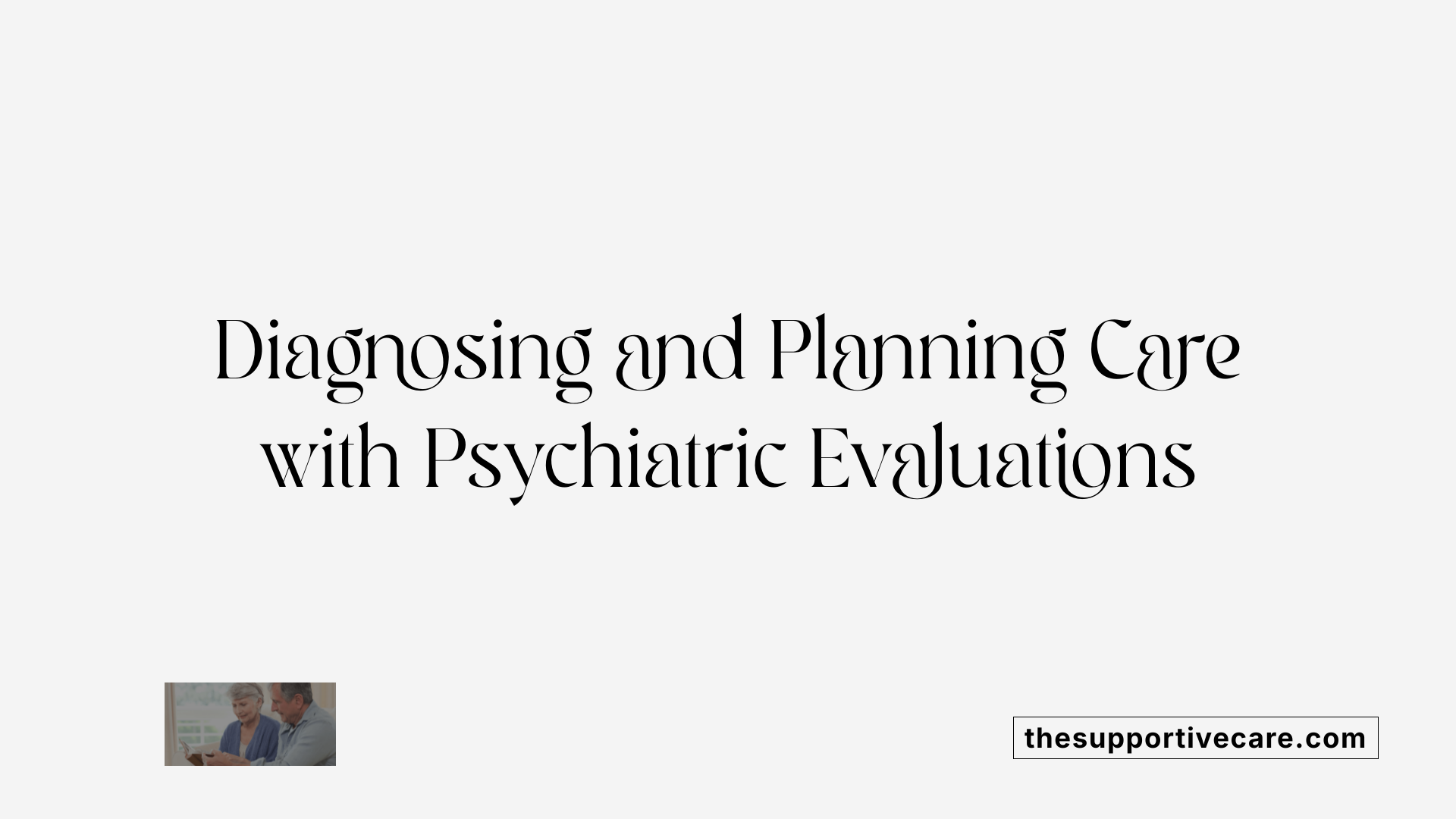
How do psychiatric evaluations aid in diagnosis and treatment planning for elderly residents?
Psychiatric assessments are vital tools in understanding the complex mental health needs of elderly residents in nursing homes. These evaluations take a holistic approach, combining clinical interviews, mental status examinations, neuropsychological tests, and reviews of medical and social histories. This comprehensive picture helps distinguish between disorders like depression, dementia, and anxiety, which often have overlapping symptoms.
By assessing social factors, functional abilities, sensory impairments, and medical background, clinicians can develop personalized treatment strategies. These may include tailored medication plans, psychotherapy options, and social support interventions designed specifically for older adults.
The importance of ongoing monitoring cannot be overstated. Using standardized tools and regular follow-ups allows healthcare providers to gauge treatment effectiveness, detect early signs of worsening conditions, and make necessary adjustments promptly.
Overall, psychiatric evaluations facilitate an interdisciplinary approach to care, enhancing diagnosis accuracy, optimizing treatment plans, and ultimately improving the quality of life for elderly residents. This thorough process ensures that mental health care is adapted to each individual’s unique needs, leading to better health outcomes and more comprehensive support.
| Aspect of Evaluation | Description | Benefit |
|---|---|---|
| Holistic assessment | Includes clinical, social, and cognitive evaluations | Accurate diagnosis, tailored interventions |
| Personalized strategies | Development of customized treatment plans | Better adherence, improved outcomes |
| Ongoing monitoring | Regular assessments and adjustments | Early detection, prevention of decline |
This approach underscores the necessity of integrating psychiatric evaluations into routine care, ensuring that residents receive appropriate, effective mental health support tailored to their specific circumstances.
Post-Consultation Outcomes and Follow-Up Procedures
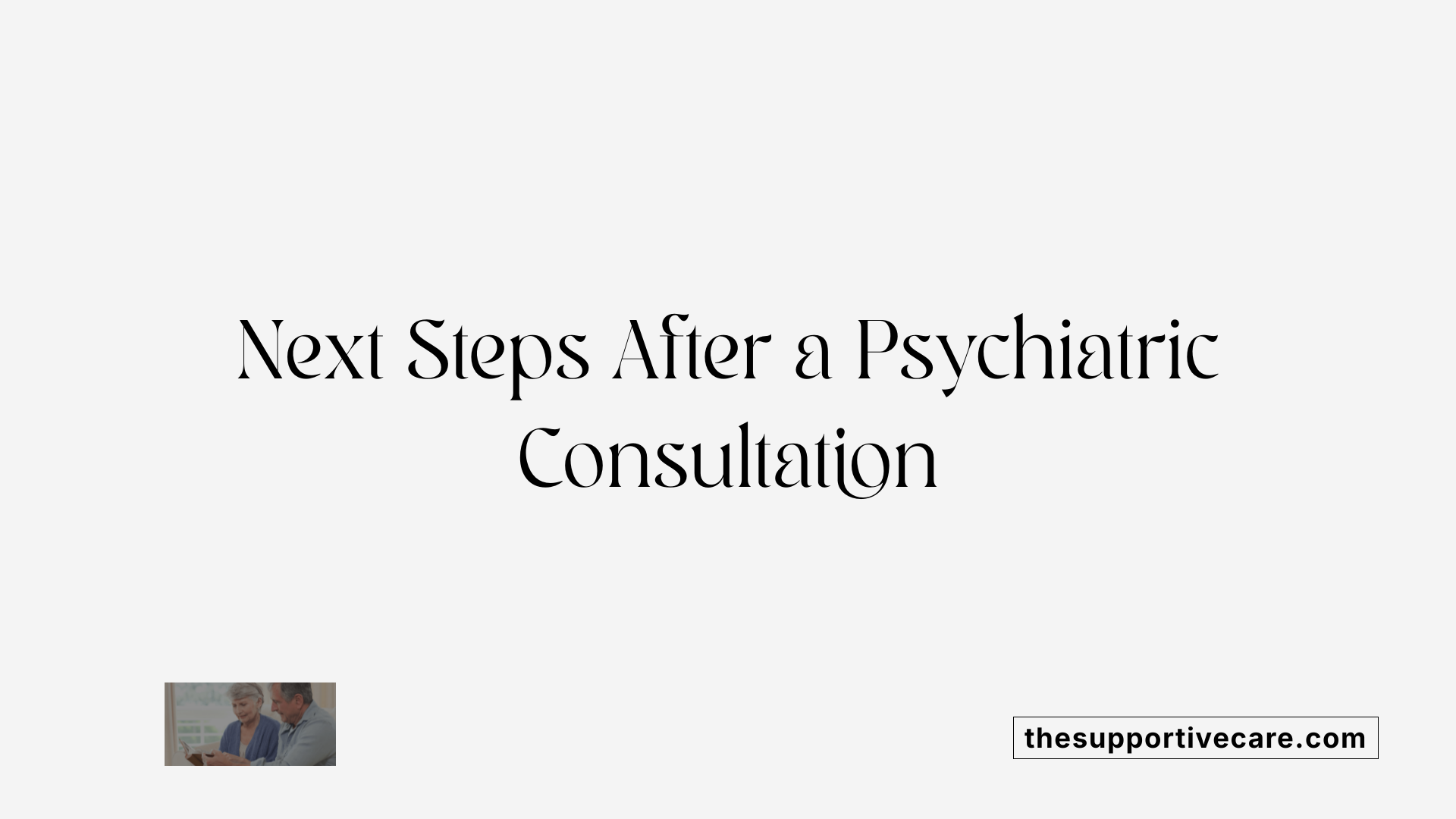
What are the typical outcomes and follow-up steps after a psychiatric consultation?
Following a psychiatric consultation in nursing homes, residents usually experience several important outcomes. The primary goal is to clarify the initial diagnosis, which guides tailored treatment strategies. These may include adjustments to medications, initiation of psychotherapy, or a combination of both, depending on the identified needs.
Developing a comprehensive treatment plan is crucial for managing mental health conditions effectively. This plan typically involves setting specific goals, scheduling regular medication reviews, and incorporating supportive therapies. Identifying ongoing care strategies ensures residents receive continuous support, whether through in-person visits or telepsychiatry sessions.
Monitoring progress is a critical phase, involving regular follow-up appointments to assess treatment effectiveness. These visits help detect early signs of relapse or new symptoms, allowing timely modifications to the care plan. Staff involvement, family participation, and coordination with healthcare providers are essential in tracking improvements and addressing issues promptly.
Reducing hospitalization risks is a significant focus of post-consultation care. Consistent follow-up can prevent deterioration of mental health, minimizing the need for emergency interventions or transfers to psychiatric facilities. Implementing systems such as telehealth consultations, especially in rural or underserved areas, enhances access and ensures sustained engagement in the treatment process.
Despite these benefits, barriers such as transportation difficulties, stigma around mental health, or systemic coordination issues may impede follow-up adherence. To overcome these challenges, facilities are increasingly adopting telepsychiatry, utilizing platforms like Zoom or FaceTime to facilitate ongoing communication. Care management programs that include education, family involvement, and timely outreach further support sustained mental health care.
| Outcome/Step | Description | Additional Details |
|---|---|---|
| Diagnosis Clarification | Confirming or refining initial diagnoses based on ongoing assessment | Ensures appropriate and targeted treatment plans |
| Treatment Strategy Development | Creating tailored medication and therapy plans | May involve medication adjustments, psychotherapy, or combined approaches |
| Progress Monitoring | Regular evaluations to assess treatment response | Early detection of relapse, managing side effects |
| Hospitalization Prevention | Reducing acute episodes requiring hospital stays | Emphasizing ongoing outpatient support and telehealth solutions |
Ensuring effective follow-up after a psychiatric consultation not only improves individual health outcomes but also enhances overall quality of care in nursing homes. Strategies like routine telehealth visits, staff training, and family engagement are instrumental in achieving these positive results.
Enhancing Mental Healthcare for Nursing Home Residents
Psychiatric consultations are a cornerstone of comprehensive mental health care in nursing facilities. They involve multidisciplinary teams working collaboratively to assess, diagnose, and manage complex psychiatric conditions prevalent among elderly residents. By understanding the processes involved, residents and families can better prepare for and participate in these evaluations, ensuring more effective outcomes. Ongoing follow-up, combined with integrated services like telepsychiatry and staff training, can significantly improve the quality and accessibility of mental health care. Continuous policy efforts and resource allocation are crucial to reducing gaps in services and supporting the well-being of aging populations in nursing homes.
References
- Psychiatric consultations for nursing home residents: a perspective ...
- Telepsychiatry for Skilled-Nursing Facilities | Conditions & Treatments
- Mental Health in Nursing Homes | Learn Why it is Important
- Quality of Mental Health Care for Nursing Home Residents
- Mental Health in Nursing Homes
- Mental Health Consultants in the Nursing Facility - Springer Publishing
- Center of Excellence for Behavioral Health in Nursing Facilities



































































































